She still defines being a girl in a band. She, the gangplanker of avant-garde art house and downtown mania, queenliest among the rampant boy-and-girl wonders that dominated the southerly part of Manhattan back when Basquiat and Lydia Lunch were just people you might run into on a Wednesday after midnight.
We are in the part of the city she laid claim to years ago, and being there was making her reflective. “I think I’m seeing things a little bit like revisionist history,” she says, staring out at the dirty diorama in front of her. “I like that it’s still freaks-only out here, for sure, but sometimes, those days are weirder and harder to access than you think.”
Suspicion toward the past is a sensible disposition for a woman whose new album tampers with the screws of memory. The Collective does this not exactly by bolting those screws all the way down, but by twisting them partially—allowing some seepage from history, and some flow from the imagined future, but mostly by honoring a current coming from an uncanny, lived-in present. For the uninitiated, it’s not exactly the Kim Gordon album to begin with—try anything else from Sonic Youth’s 15 studio albums and seven EPs, Gordon’s ‘90s solo work in Free Kitten, even her writing for Artforum to get familiar with her sounds and visions—but The Collective is not really about getting to know Gordon anyway. This is more like a flight—from time, but with it too.
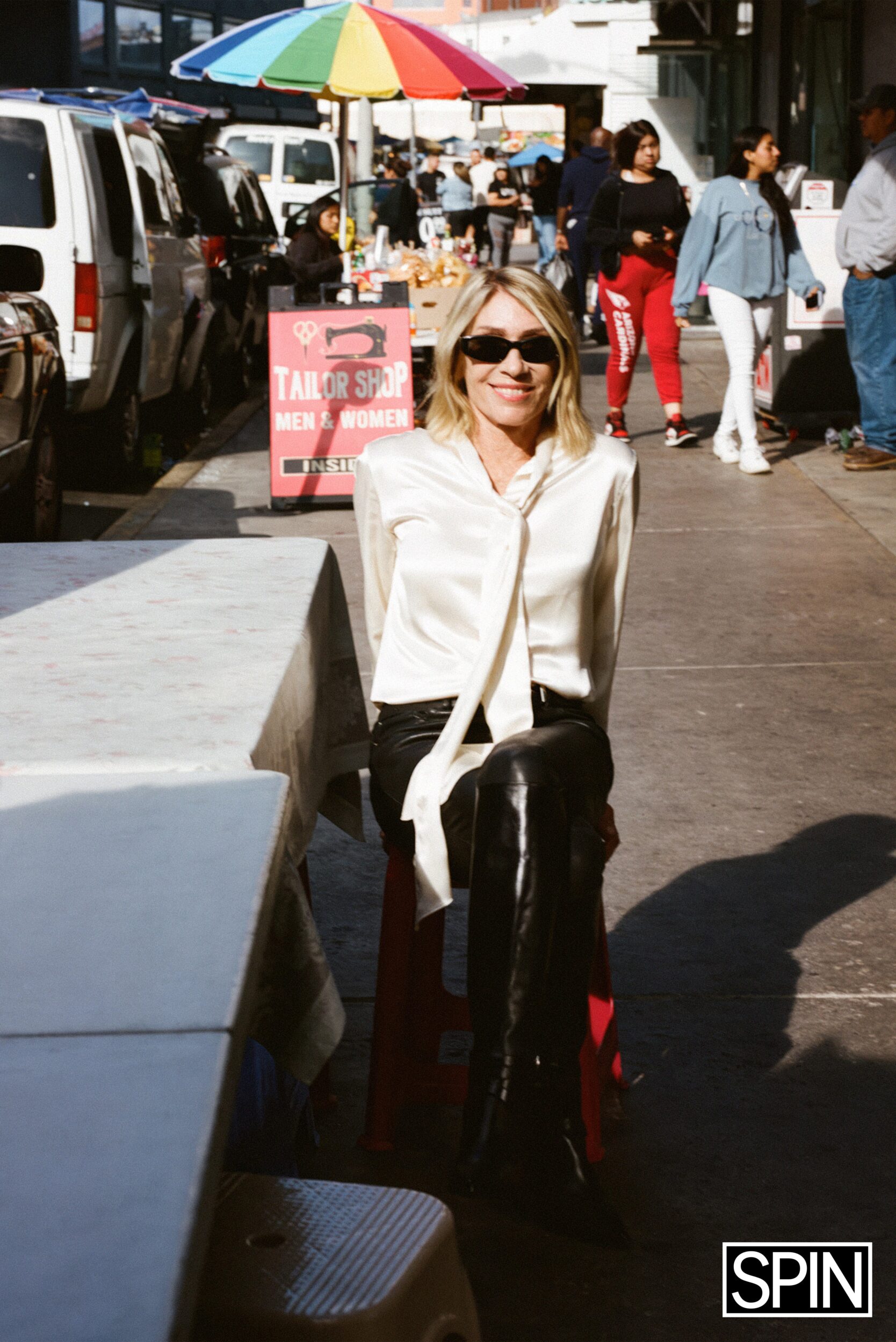
“Shit,” she whispered. We were early. The “funny old Chinese mall” where she’d planned to poke around was mostly empty at that time of day, and now, stepping out from the deserted storefront to wind among the streets that noisily sold octopi, pomelos in cling film, woody lotus roots, and pyramids of yams, her croissant-colored head bobbed as it began rerouting us through the lower bits of the Lower East Side. “I wish I was better at Chinese,” she said.
She isn’t, despite spending a fair chunk of her tweenhood in Hong Kong, and once, in a 2007 movie, playing a mob boss who spoke mostly in Cantonese threats. “The lines were all like, ‘you’ve fucked it up enough!’ or ‘bring her to me now!,'” she recalled with a smile. “I’d get kicked out of any shop here if I could remember them.” These days, her dominant language is still Californian. She’s spending this year in L.A.—a mirror to her teen years there in the ‘70s—and the state has blessed her with that sticky, golden accent, which remains one of her most crucial musical tricks. On all her tracks, it sounds like she’s sun-drunk, vocal cords thrashed by saltwater, adenoidal. You’ll hear that voice on The Collective, but when it speaks in normal human sentences, it’s a low shrug of a thing that mounts a small gallery of feeling: bemused to bored to charmed to solipsistic.
Recollection has been the chief activity at her home in Los Angeles’ Los Feliz neighborhood of late, where she’s been enjoying long stretches of solitude and reading a lot of Marguerite Duras. “Lots of writing,” she nodded. “It’s nice to be quiet and claustrophobic sometimes.” Much of this evening seclusion—or as Duras wrote, meditative hours spent under “electric light, and the room in shadow”—has impelled Keller, a memoir about her late brother. The title is mononymic because he’s her great totem, a stand-in for fear, male garrulity, growing up in L.A., the power he held over her. But also because he’s the sort of figure she wants to fold up and put aside. There’s a part in a recently published excerpt where a man at the crematorium, filling out Keller’s death certificate, asks her what his job was. She wrote:
“I said he never worked, he was schizophrenic. The man pressed me on it and said my brother had to have an occupation, so I said he was a poet. Next question: ‘How many years did he do that for?’”
“I think I know my inheritance from him by now,” she says to me. “He wasn’t an original, but he was sort of a romantic—to me, he just represents so much stunted potential. I guess I wanted to take his unselfconsciousness, and I think I learned how to reach it by performing it over and over again. I learned by doing.”
She walks in a mystic’s manner—serenely reflective, head lowered. She’s wearing a wool beret and a cardigan with buttons that look like Sicilian coinage. With eyeliner tightlined just on her bottom lids, she looks the part too. Keller’s only a part of the history she’s bewitched behind her. When she’s reminded that we’re only five minutes from her famous old apartment, the one where in 1981 she’d formed a band with her ex-husband that would shift the nature of American music, she laughs.
Time really was the anima of Sonic Youth. They were post-everything, inasmuch as they mixed and matriculated genre and warped and screwed it until their music sounded like avant-garde played as if it were scraggly guitar rock with the occasional yowling of punk. It wasn’t so much a severance but a maceration of underground music’s prevailing styles at the time. When Sonic Youth broke up in 2011, Kim formed Body/Head with collaborator Bill Nance, and their polytonal, bluesy, arrhythmic stretches of improvisational songs felt like a swallowing and smashing of even that.
“So much of avant-garde—or really any music—is made out of making accidents,” she says, navigating southbound. Has she always been drawn to intense, doomy walls-of-sounds because they offer her safety? “Painters don’t like to start on a white canvas, and adding structure anywhere can sometimes be…” [here she searched for both a street and a word] “effective.” Noise offers her a framework for embellishment, destruction, and inspection. “Really,” she said, “I just want to damage sounds as much as I can.”
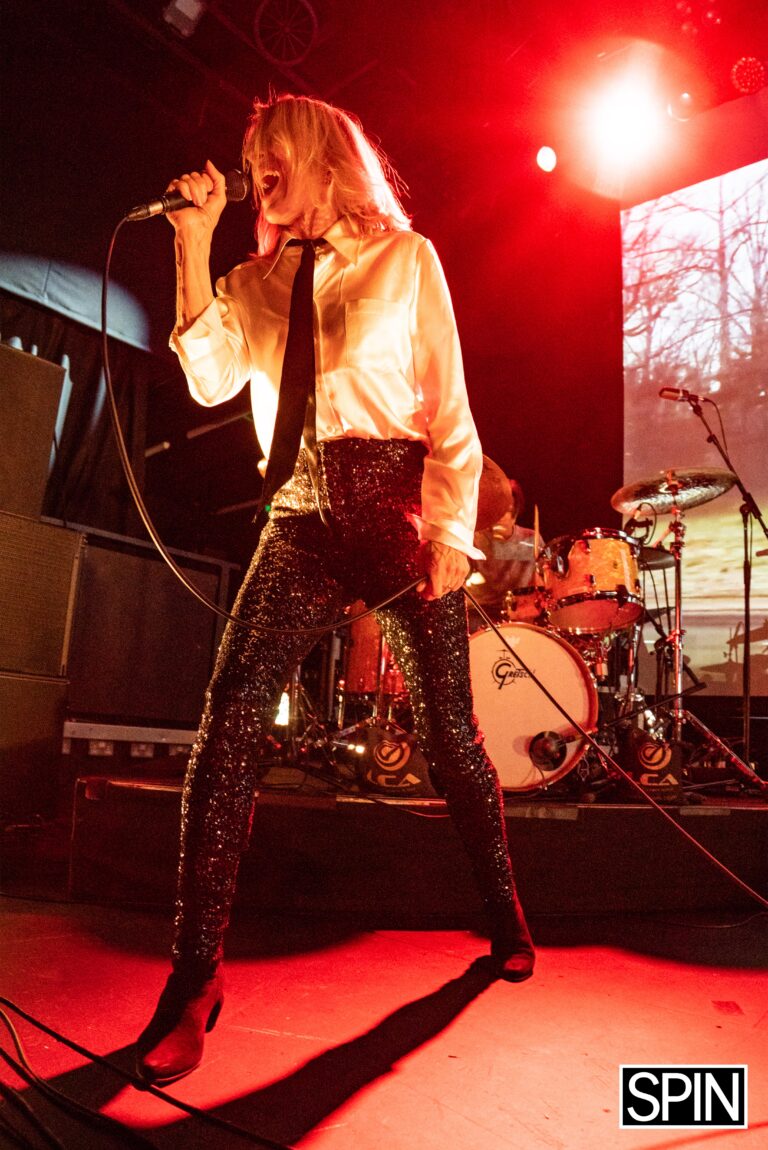
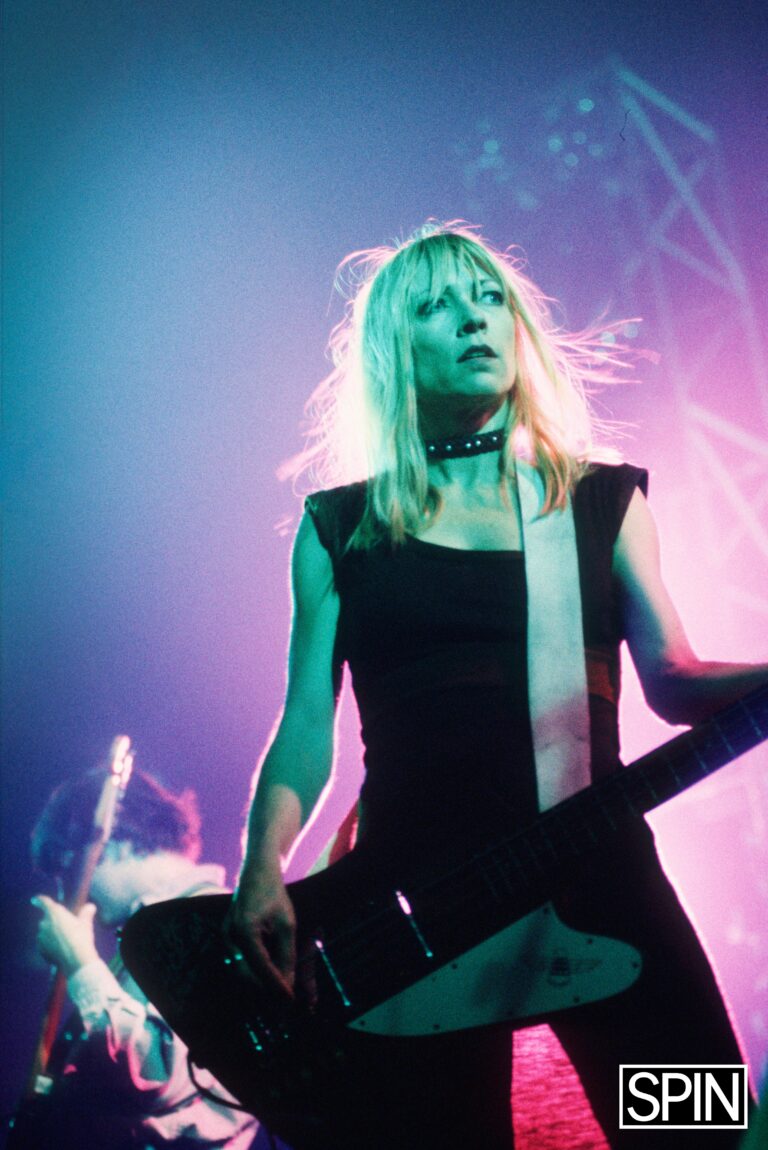
The spirit of The Collective, a darkly vapored album of bored-chic caprices, grim ponderings, and drum beats zooted enough to warrant comparisons to Playboi Carti, Suicide, and Einstürzende Neubauten, is certainly in line with Kim’s usual sledgehammer sonic approach. It’s her second LP made with producers Justin Raisen and his younger brother, Jeremiah, who share a CV studded with artists like 6ix9ine, Charli XCX, and Yves Tumor. These are performers who live on a particularly left-field island of clangy pop, who adore noise sensibilities and seem to focus their bloodletting energy around lyrics usually delivering some sort of chilly poem. They make the Top 40 feel like a place for disgorgement.
The Collective runs in a likewise lustral fashion. There’s lots of punched-meat-percussive foley, screaming, the unholy doodling of digital guitar filters and trappy, trashy drums—the types of sounds Justin Raisen calls a product of “Jack-Nicholson-in-The-Shining-level obsession.”
This work demanded more out of him than any collaborative juncture with his spring chicken-y upstarts, he said, because “they have a different attitude, and a different history. With Kim, it’s like working with John Cale,” for whom he also produces. “He’s insanely fucking crazy on his shit,” he added warmly. “The point is to make them feel like they’re doing something at least two steps away from what they think they want. If you can get them to feel like, ‘this is me, like this is so me,’ then I’ve done my job.”
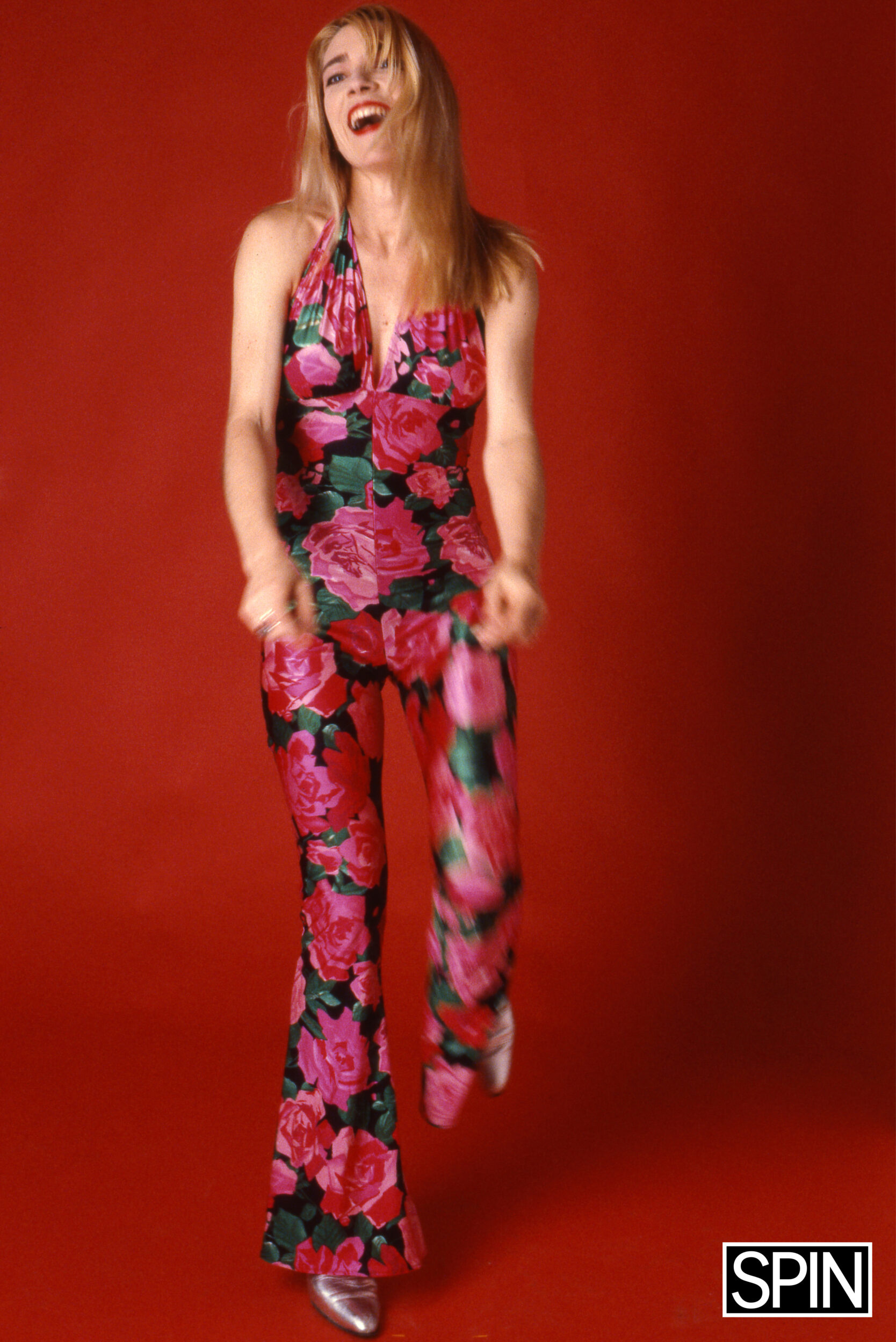
“I think all the sounds Justin makes for me are funny,” Kim shrugged, back on the street in Chinatown. Despite some TikTok teens treating this album like a tear in the space-time continuum, in reality, The Collective is a deepening of everything she's been doing. Rock was bored down to its most elemental state right when she started making music—primitive percussion, monkey-brain emotions, guitars intentionally off-tune and broken. The album’s lead single “BYE BYE” sounds like a scrapheap of click-click-click-clickclickclick trap drums shoved up against a cheap tape recorder, all with the energy of a Rottweiler on the loose.
Raisen’s production, which provides a contained rumpus area in which Gordon can thrash around, demands heavy contrapuntal poetry. Writing lyrics has always been a complex affair (“I would be too self-conscious if I just thought of writing lyrics for a song,” she wrote in her 2015 memoir, Girl in a Band), but on The Collective, she was assisted, at least tangentially, by the prompting of novelist Rachel Kushner, who shares Kim’s peerage with the bohemian, punky pasts of L.A. and New York.
Kushner would be “waiting in line at a pharmacy or something” when she’d let her suggestions fly, each one poking a pressure point meant to induce in Kim her flair for occult-sounding koans, vignette-y fragments of history, and strange little poem-bursts. One text from Kushner reads, “Something about you singing about bowling feels cute and comic,” and Kim responds, “I’m the worst bowler.” That became “Trophies,” with a chorus about a “boyfriend’s trophies” sung with enough vim and blood to suggest some sort of vengeance will not go undelivered.
A track at the crown of The Collective called “The Candy House” guts the past most tellingly. It’s based on Jennifer Egan’s 2022 sci-fi novel of the same name, set in a sideways dimension where a memory upload app called "Own Your Unconscious" rules the world by effectively nixing the idea of private information, secrets and personal history. Kim was awed. “It was one of the best things I’ve recently read,” she said.
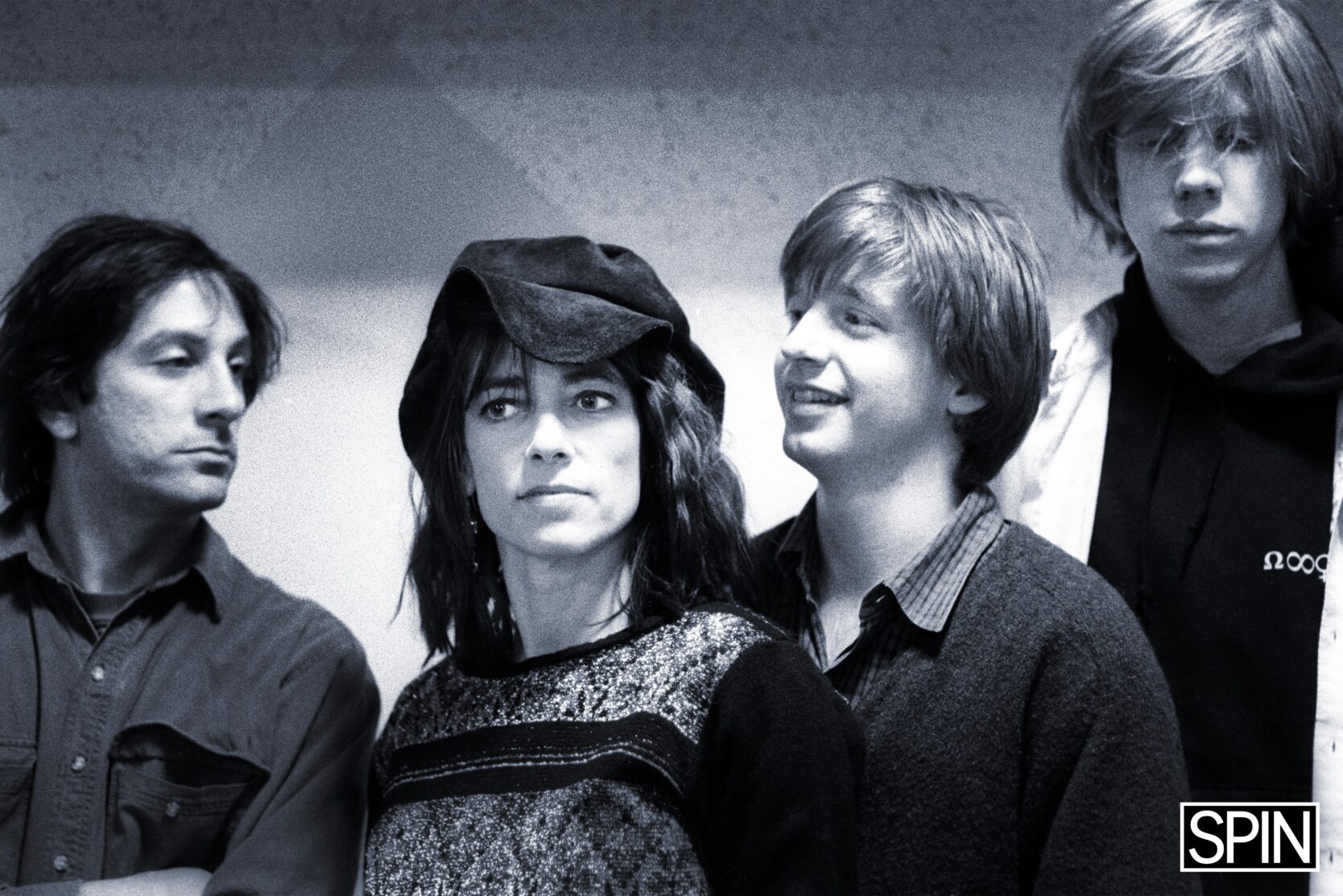
She loves a book of speculative fiction set in a nightmarish near-future, with tech a little more advanced and invasive than the iPhone’s, but not by much. Here we go with another celebrity, burnt into history books, burnished by time, definitive of big, gassy ideas, who’s made an album about a future she feels suspicious of because she’s lived through a world she can now see bending in the direction of dystopia.
But from The Collective, to the way that she’s pocketed points of her past, it seems Kim was attracted to Egan’s premise not just because of its sinisterism, or the way it’s against smartphones as an arch-villainous agent. Her adoration for The Candy House feels like a fascination with the idea that we could rid ourselves of that niggling psychic load following us around. The concern at the core of the book and the album is a cathartic dream: let’s get really free of the past. It’s a fantasy of an unburdened mind.
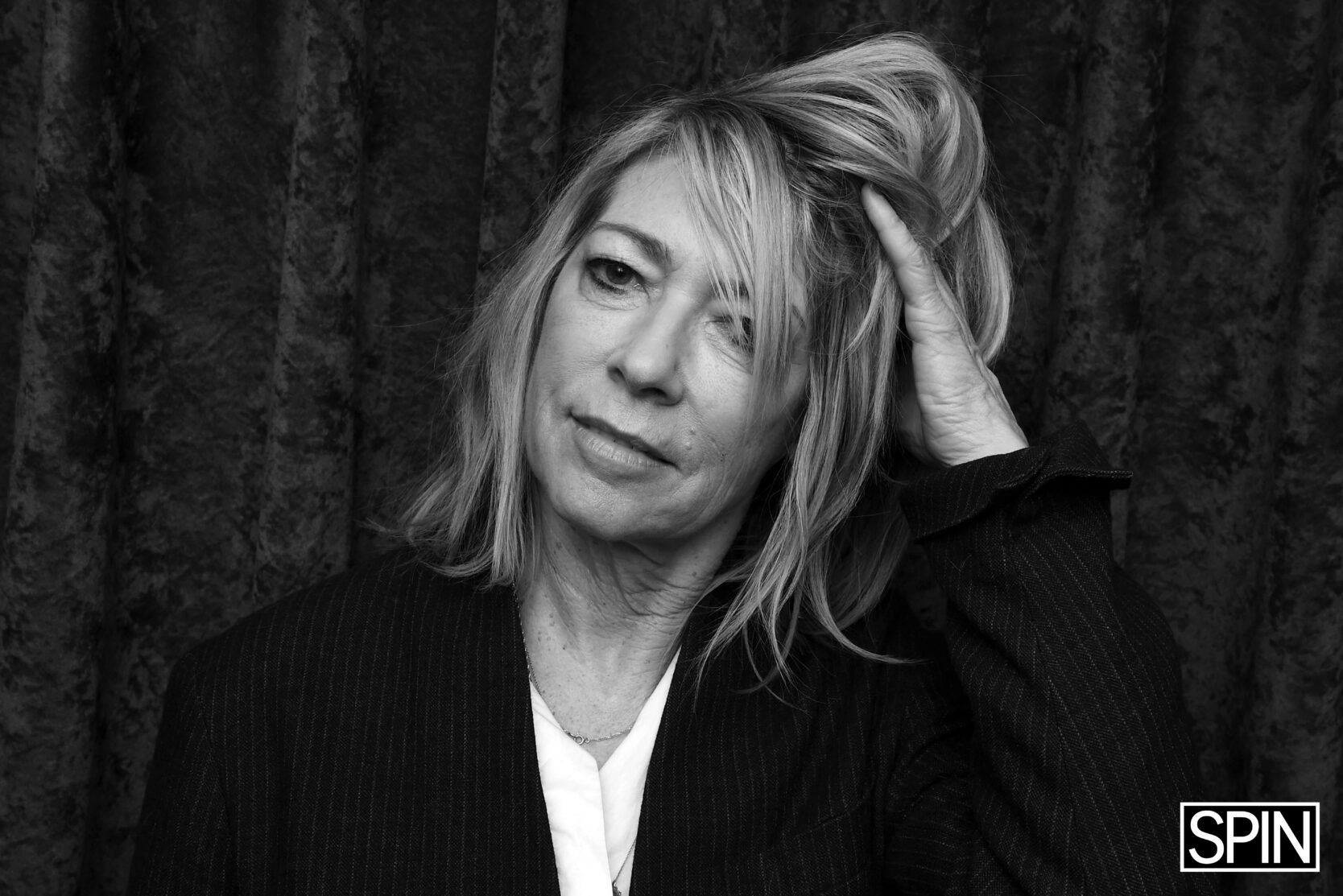
The Collective makes into melodrama the ancient dyads of remembering and forgetting, the desire for one kind of intensity as a means of fighting off others. “I guess the goal was to stir up some memories,” Kim says, paraphrasing a lyric from “The Candy House.” Stir, maybe. Working through the past has felt like the dominant sport of a woman who has defined and seen too much of it. It seems like she’d rather pureé history into a pulp.
In a 1983 essay for Artforum, Gordon wondered, “How long can someone continue to exert intensity before it becomes mannered and dishonest?” Asked that question again in 2024, she’s surprised she’d written this. That piece sharply explained how Elvis and Janis Joplin and Jim Morrison used their media-created images “to destroy, within their own framework, the standard of what had gone before,” and their memories, in their wake, gave “rise to new forms.”
In the Alex Ross Perry-directed video for The Collective track “I’m a Man,” the presence of Gordon’s 29-year-old daughter Coco is there as a stand-in for Kim, coolly shot in 8mm so as to evoke, per Ross Perry, an “underground film being projected on a sheet in the East Village in 1988.” It’s nostalgia-baiting, but as he says, her “sound is so ineffably linked to a mood and feel that to contradict that is a challenge not worth attempting.”
Coco is, in fact, in every video for The Collective. She’s idling in the drone-assisted clip for “Psychedelic Orgasm;” and in “BYE BYE,” she’s shoplifting from a mini-mart.
Kim’s in the mood to see Coco and sends her a text and looks up: “She’s actually not far.”
After another safari past weed store pop-ups and hundreds of cheap boutiques that have made the city, as Gordon once put it, “a moated kingdom,” Coco’s towers over us in the flesh. In a concrete studio space, she is busily hawking a small monsoon of clothes she cannot or doesn’t want to keep: featherlight T-shirts gifted from designers, exotic two-piece suits too outré for conventional tailoring, old pairs of jeans.
Coco is a model, a poet, an actress—the standard bouquet of professions for beautiful and lucky children. As shoppers fingered the racks, it was difficult not to watch mother and daughter smile at each other. To say they look alike would be like saying that Dolly the cloned sheep bears some resemblance to her duplicate. From their twin sets of sleepy eyes to the relaxed posture that makes them look slack and serious at once, Coco is Kim’s double.
“Aren’t those mine?” Kim asked, lifting a pair of two-toned denim pants (ventrally blue, dorsally gray) off a stack. “Um. Yes.” Coco reddened. “They didn’t look amazing on me.”

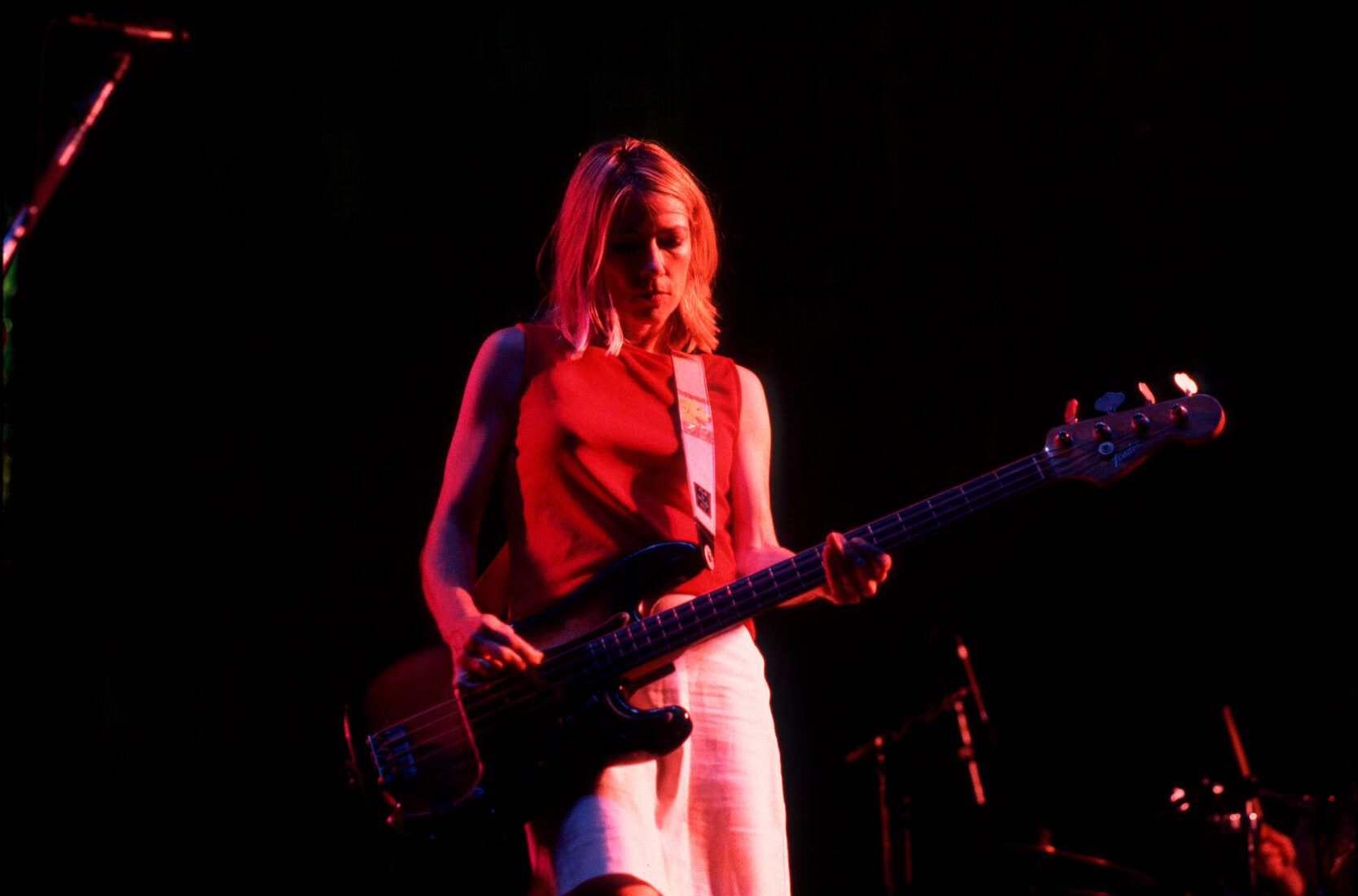
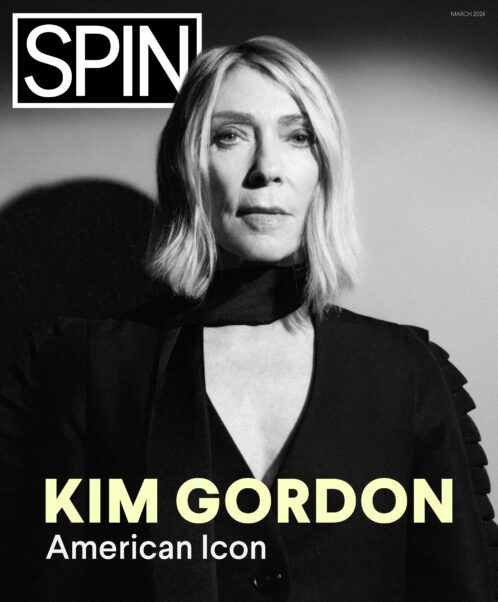
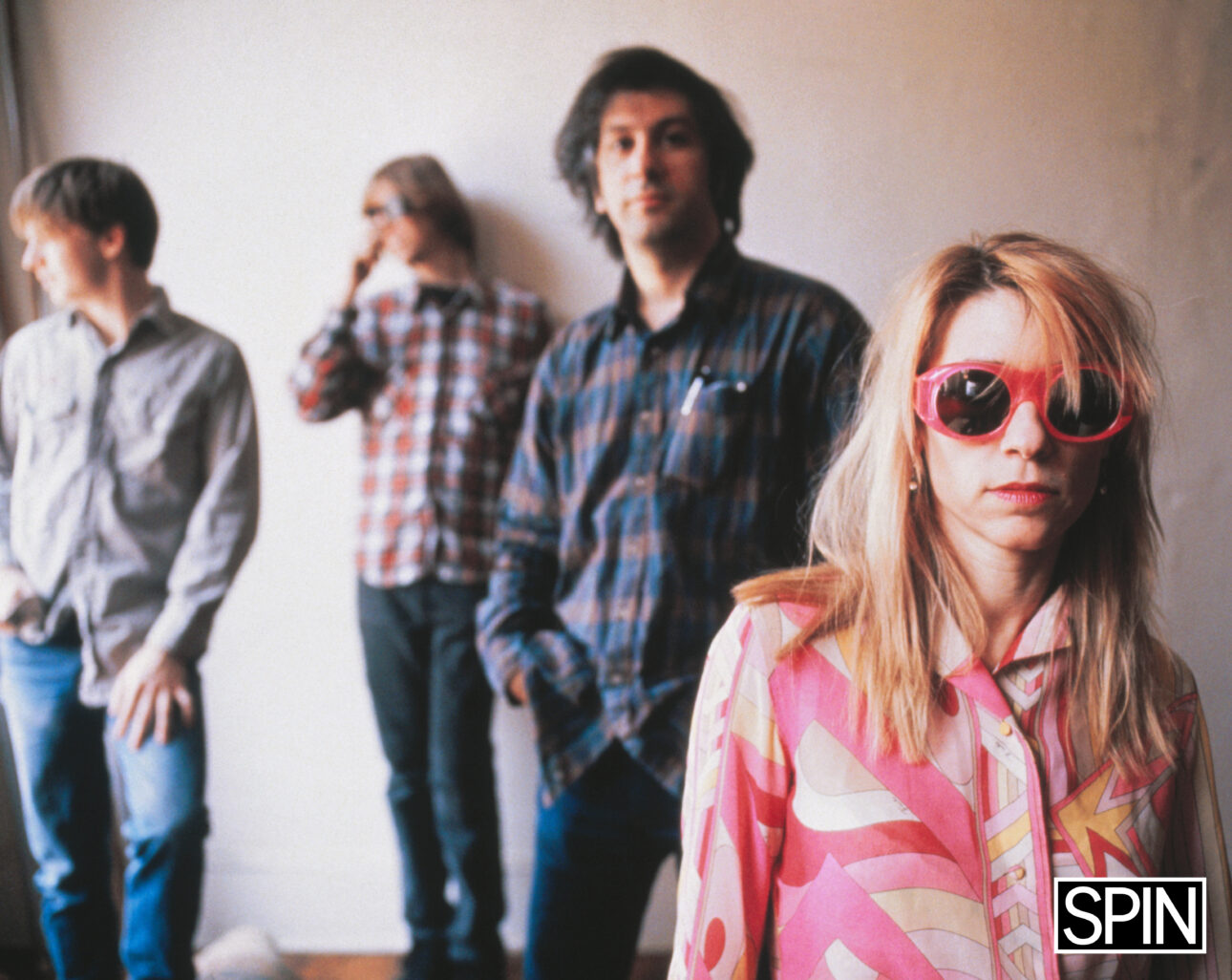 Photo Credit: Chris Carroll/Corbis
Photo Credit: Chris Carroll/Corbis
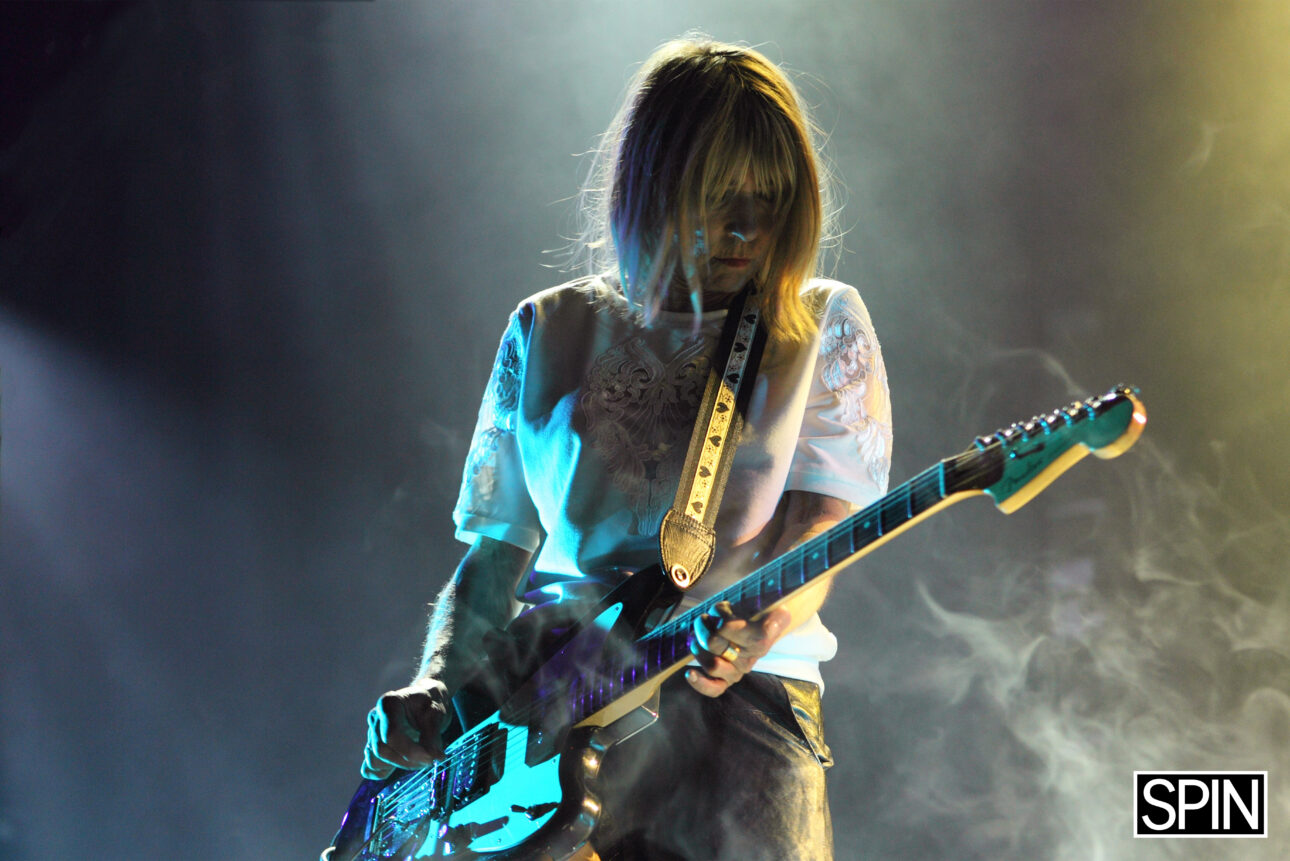 Photo Credit: Burak Cingi/Redferns via Getty Images
Photo Credit: Burak Cingi/Redferns via Getty Images
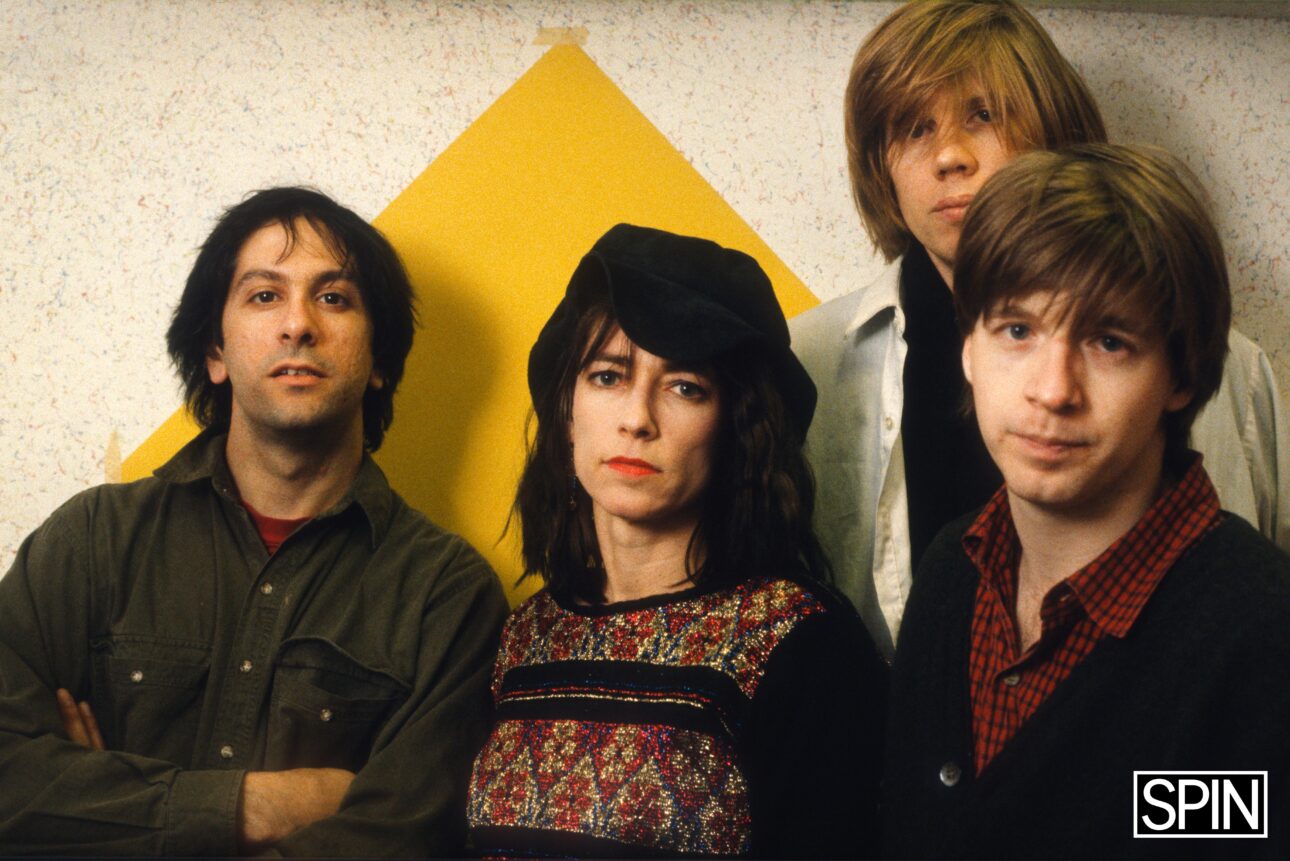 Photo Credit: Gie Knaeps/Getty Images
Photo Credit: Gie Knaeps/Getty Images
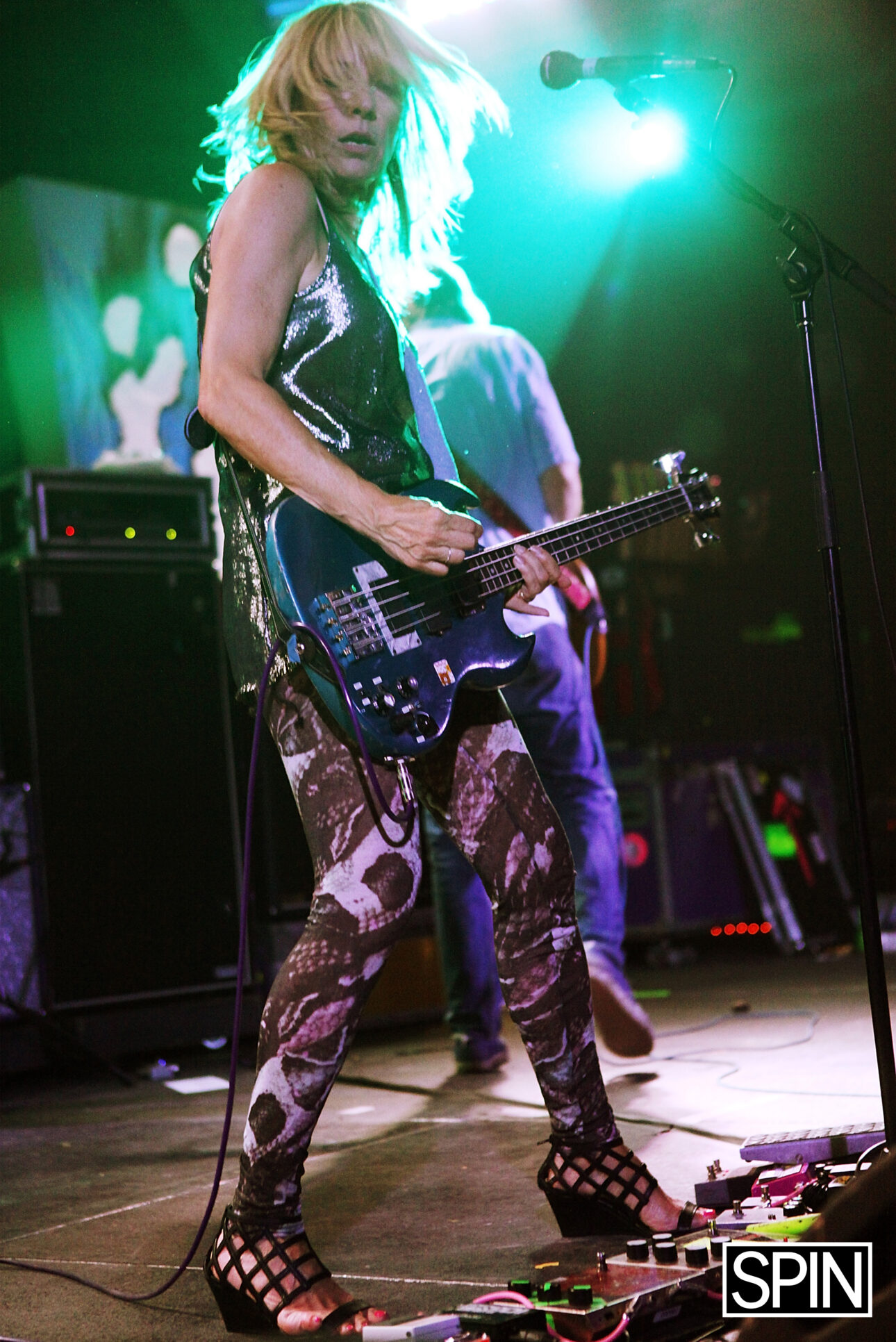 Photo Credit: Roger Kisby/Getty Images
Photo Credit: Roger Kisby/Getty Images
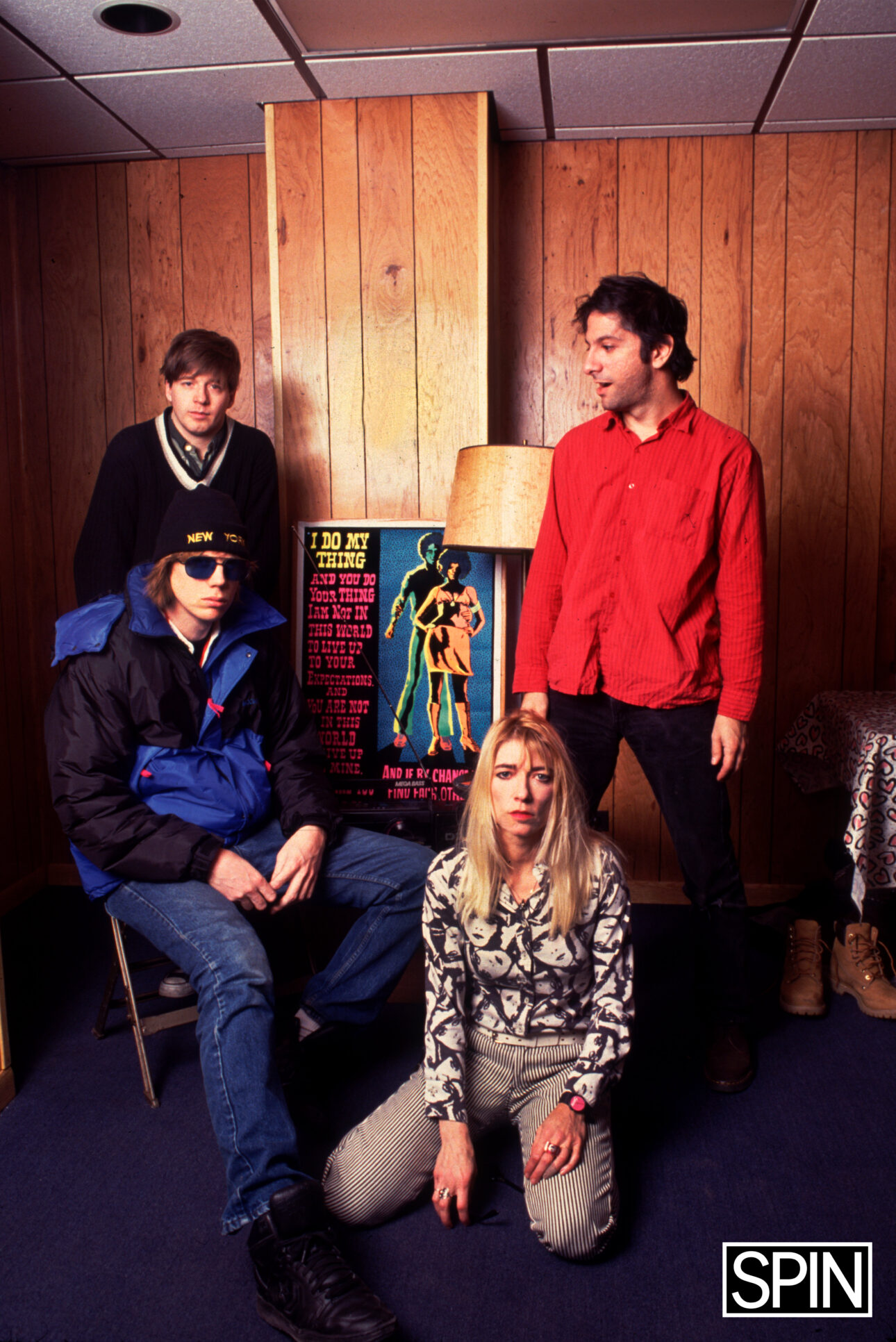 Photo Credit: Paul Natkin/Getty Images
Photo Credit: Paul Natkin/Getty Images
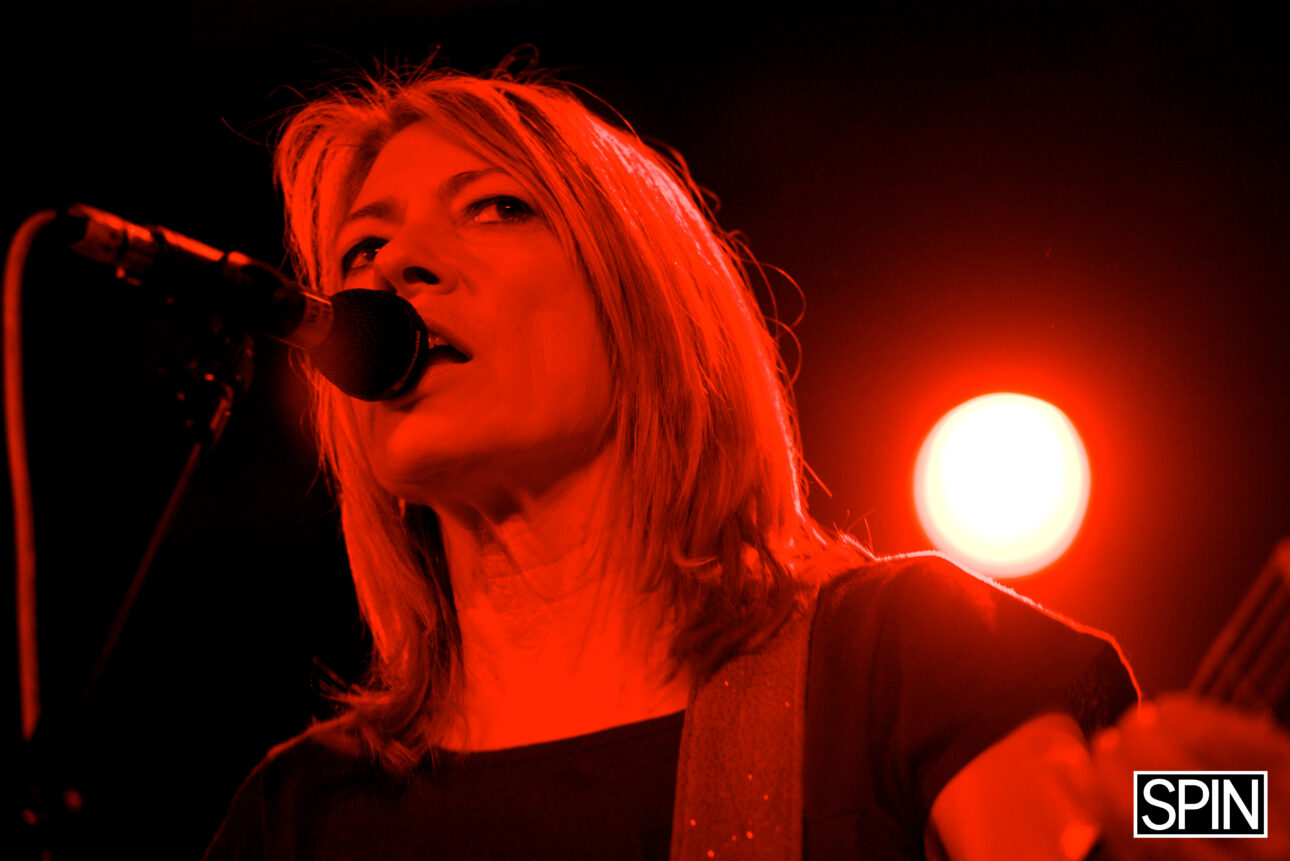 Photo Credit: Juan Naharro Gimenez/Getty Images
Photo Credit: Juan Naharro Gimenez/Getty Images
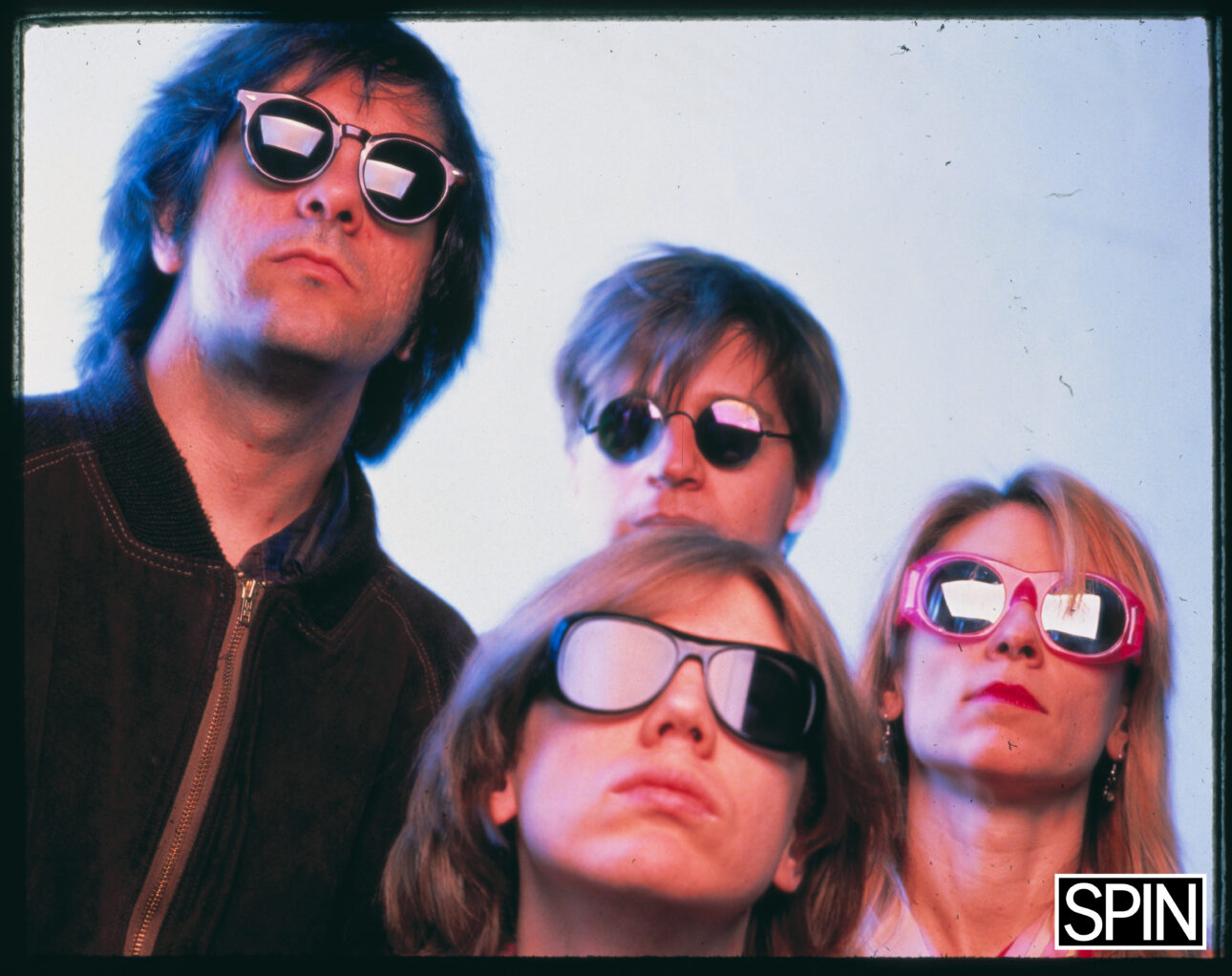 Photo Credit: Chris Carroll/Corbis via Getty Images
Photo Credit: Chris Carroll/Corbis via Getty Images


